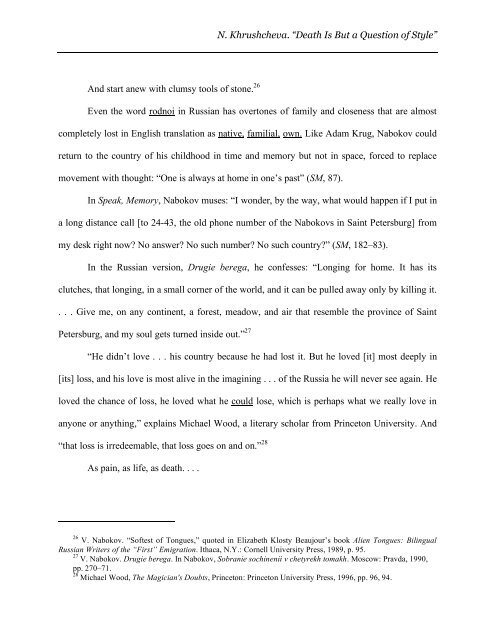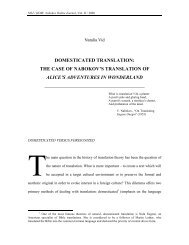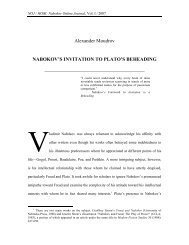Nina L. Khrushcheva DEATH IS BUT A QUESTION OF STYLE 1
Nina L. Khrushcheva DEATH IS BUT A QUESTION OF STYLE 1
Nina L. Khrushcheva DEATH IS BUT A QUESTION OF STYLE 1
You also want an ePaper? Increase the reach of your titles
YUMPU automatically turns print PDFs into web optimized ePapers that Google loves.
And start anew with clumsy tools of stone. 26<br />
N. <strong>Khrushcheva</strong>. “Death Is But a Question of Style”<br />
Even the word rodnoi in Russian has overtones of family and closeness that are almost<br />
completely lost in English translation as native, familial, own. Like Adam Krug, Nabokov could<br />
return to the country of his childhood in time and memory but not in space, forced to replace<br />
movement with thought: “One is always at home in one’s past” (SM, 87).<br />
In Speak, Memory, Nabokov muses: “I wonder, by the way, what would happen if I put in<br />
a long distance call [to 24-43, the old phone number of the Nabokovs in Saint Petersburg] from<br />
my desk right now? No answer? No such number? No such country?” (SM, 182–83).<br />
In the Russian version, Drugie berega, he confesses: “Longing for home. It has its<br />
clutches, that longing, in a small corner of the world, and it can be pulled away only by killing it.<br />
. . . Give me, on any continent, a forest, meadow, and air that resemble the province of Saint<br />
Petersburg, and my soul gets turned inside out.” 27<br />
“He didn’t love . . . his country because he had lost it. But he loved [it] most deeply in<br />
[its] loss, and his love is most alive in the imagining . . . of the Russia he will never see again. He<br />
loved the chance of loss, he loved what he could lose, which is perhaps what we really love in<br />
anyone or anything,” explains Michael Wood, a literary scholar from Princeton University. And<br />
“that loss is irredeemable, that loss goes on and on.” 28<br />
As pain, as life, as death. . . .<br />
26<br />
V. Nabokov. “Softest of Tongues,” quoted in Elizabeth Klosty Beaujour’s book Alien Tongues: Bilingual<br />
Russian Writers of the “First” Emigration. Ithaca, N.Y.: Cornell University Press, 1989, p. 95.<br />
27<br />
V. Nabokov. Drugie berega. In Nabokov, Sobranie sochinenii v chetyrekh tomakh. Moscow: Pravda, 1990,<br />
pp. 270–71.<br />
28<br />
Michael Wood, The Magician's Doubts, Princeton: Princeton University Press, 1996, pp. 96, 94.
















